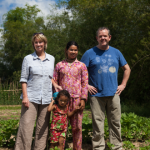An international food security project that helps low-income women farmers in Cambodia farm fish and garden at home will now help them become entrepreneurs, thanks to more than $1 million in funding to the University of British Columbia from the Canadian International Food Security Research Fund.
Researchers at UBC’s Faculty of Land and Food Systems and Helen Keller International (HKI) run the project, called Fish on Farms, which aims to fight malnutrition among poor women and children in rural Cambodia.
The funding, totaling $1,178,240 to UBC, will allow the project to offer business skills development for the women farmers to manage their finances and sell their surplus produce, expanding food production from 900 to 22,500 households.
UBC and HKI partnered with the Sauder School of Business’ Arc Initiative, which provides entrepreneurial training in developing countries, to strengthen the project’s business potential.
“Working with these farmers to facilitate the productivity of their farms will be a tremendous opportunity for our team,” said Sauder instructor Jeff Kroeker, founder and leader of the Arc Initiative. “It will give us the chance to sow the seeds of new ventures that have the very real potential to improve the health and economic wellbeing of people in the region.”
With the new partnership, UBC students will travel to Cambodia for rotating 4-month internships along with Sauder alumni who will act as advisors. They will help the farmers launch business ventures or social enterprises with the food they grow. Kroeker and a team of Sauder students and alumni travelled to Cambodia last month to start the work.
Rice-based diets in rural Cambodia tend to lack adequate protein, fat and micronutrients, which can lead to anemia, vitamin and mineral deficiencies and stunting in children’s growth. Since 2012, Fish on Farms has helped women farmers establish fishponds and gardens at their homesteads, providing them with greater access to more nutrient-rich foods to improve both their diets and livelihoods.Background
Additional quotes
Rickey Yada, Dean of UBC’s Faculty of Land and Food Systems
“The new funding will help take Fish on Farms to the next level in addressing food security in Cambodia,” said Yada. “The unique collaboration between food and nutrition scientists and business experts at UBC offers the opportunity to stimulate real economic growth and further improve the quality of life for subsistent women farmers and their children.”
About the Fish on Farms project
Fish on Farms seeks to increase and diversify homestead food production and provide low-income households with affordable and nutritional foods, as well as new sources of income opportunities. So far 300 fishponds and 600 gardens have been established. The project also educates mothers about child feeding, nutritional intake, and sanitation and hygiene practices.
Preliminary research data shows the women farmers involved with the project have produced more vegetables and enjoyed higher incomes than other households, which they used to purchase additional nutritious food and fund their children’s education. The project also granted women greater agency with 75 per cent of the women reporting having money they could spend without their husbands’ permission after one year of homestead food production.
About The Arc Initiative
Formed in 2010, the Arc Initiative has already established entrepreneurship capacity building programs in Ethiopia, Colombia, Rwanda and Peru. Drawing on business leaders, faculty, young professionals and students, the program engages directly with entrepreneurs on the ground to enhance their business operations.
About the funding
The International Development Research Centre and the Department of Foreign Affairs, Trade and Development Canada fund Fish on Farms through the Canadian International Food Security Research Fund. The total new funding for the project is $4,464,540 with Helen Keller International receiving $3,286,300.
The $1,178,240 funding to UBC contributes to the university’s start an evolution campaign, the most ambitious fundraising and alumni engagement campaign in Canadian history, with the twin goal of raising $1.5 billion and involving 50,000 alumni annually in the life of the university by 2015.

